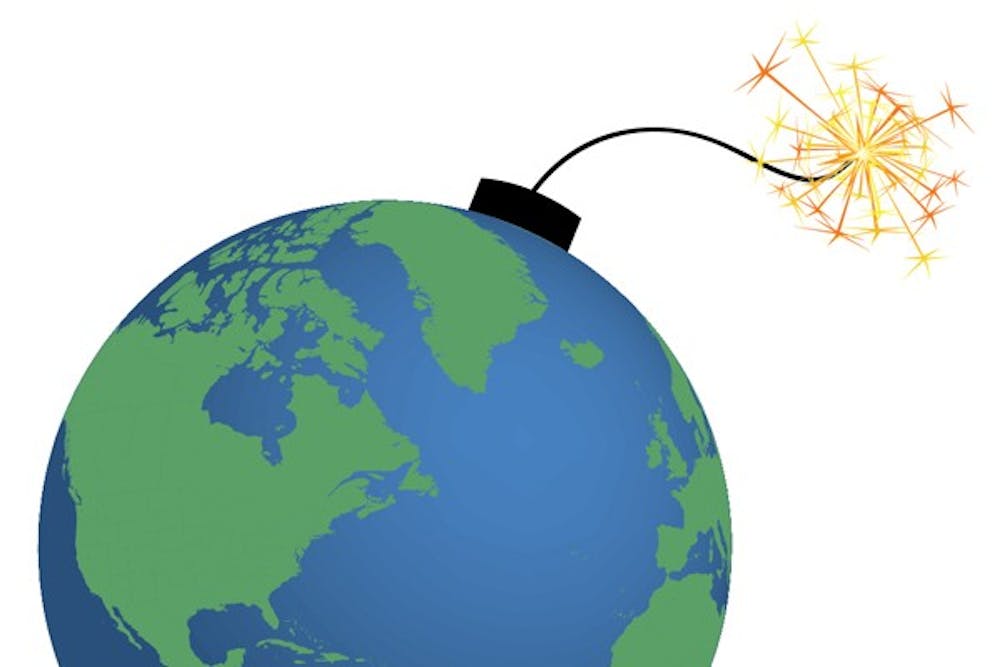In 15 days, our planet will perish — or so say some musings.
“The 2012 apocalypse narrative consistently comes at us in so many mediums that there is no way to counter it,” Kristen McCauliff, an assistant professor of communications, said. “Myths like this circulate especially in social media because it has no checks and balances. So, when any news pops up on one of our many screens, we think it’s real.”
The 2012 apocalypse is old news, dating back to the ancient Mayan civilization, whose calendar reaches its end Dec. 21 — the end of one cycle, that is. The calendar will display what is essentially a string of zeroes. This calendar is based on multiple cycles of time, and the almost 400-year period of the 13th Bak’tun is the one ending.
A belief is that the Mayans mark this date as the end of life on Earth.
One prediction includes the collision between Earth and another called Nibiru as well as a convergence of our galaxy and the sun. NASA astronomer David Morrison refutes these theories in a statement to Discovery News.
The media’s — particularly the Internet’s — embrace of these deadly possibilities does not surprise McCauliff, she said.
“In the news, if something bleeds, it leads,” she said.
Anthropology professor Christina Blanch said she believes this long-held fixation with the macabre complements today’s current fearful state.
“[The 2012 apocalypse] is popular for the same reason the idea of a zombie apocalypse is so popular,” Blanch said. “This stuff becomes popular during times like these when there are social problems, economic problems [and] social meltdowns.”
There is a similar trend in religion — the root of most apocalyptic discussion.
Religious studies assistant professor Justin Ritzinger said religions focus on end-times less to prepare for the future than to catalyze discussion of present problems. Ritzinger used the example of a man one might see in Times Square holding a cardboard sign claiming “The End is Near.” He uses the “end” as something of a threat in the hopes of opening people’s eyes to the importance of the present.
Sophomore communications major Joey Parrish said he hopes the 2012 apocalypse scare will inspire the same kind of focus on improving and cherishing the present.
“Most people want to be part of a big, shared experience, so they latch on to any frenzy of pandemonium so they can say ‘I was a part of that, I was a part of history,’” Parrish said. “If they really want to be part of that, they should embrace real issues rather than the 2012 apocalypse, the stuff of science fiction. They should embrace issues like global warming.”
Rick Belbutoski, a junior communications major, agreed.
“Climate change is an issue that we’ve known about for a long time, but, unfortunately, the masses have responded to it with resounding silence,” he said. “We need to focus on that instead of 2012. I mean, if the Mayans were incapable of predicting their own extinction, I seriously doubt they have any legitimate insight about the extinction of the whole human race.”
As people panic and ignore the current climate change crisis, Dec. 21 would have been cause for celebration in the Mayan culture.
According to a National Geographic article, Emiliano Gallage Murrieta, Chiapas state division director of Mexico’s National Institute of Anthropology and History, said the Mayans saw the end of the long-count calendar not as an end to everything, but just the start of a new cycle.
“It is like for the Chinese, this is the Year of the [Rabbit], and the next year is going to the Year of the Dragon, and the next is going to be another animal in the calendar,” Murietta said in the article.
Junior communications major Caleb New attempted to explain people’s hesitance to approach real threats and their indulgence in more fantastical fears like Dec. 21.
“People have always been afraid of the future and the unknown, but it will always remain a fear if they never face it and attempt to understand it,” he said.
Current Mayan era to conclude on Dec. 21, experts invalidate apocalyptic theories
The Daily News

DN ILLUSTRATION by Joy Sobey

